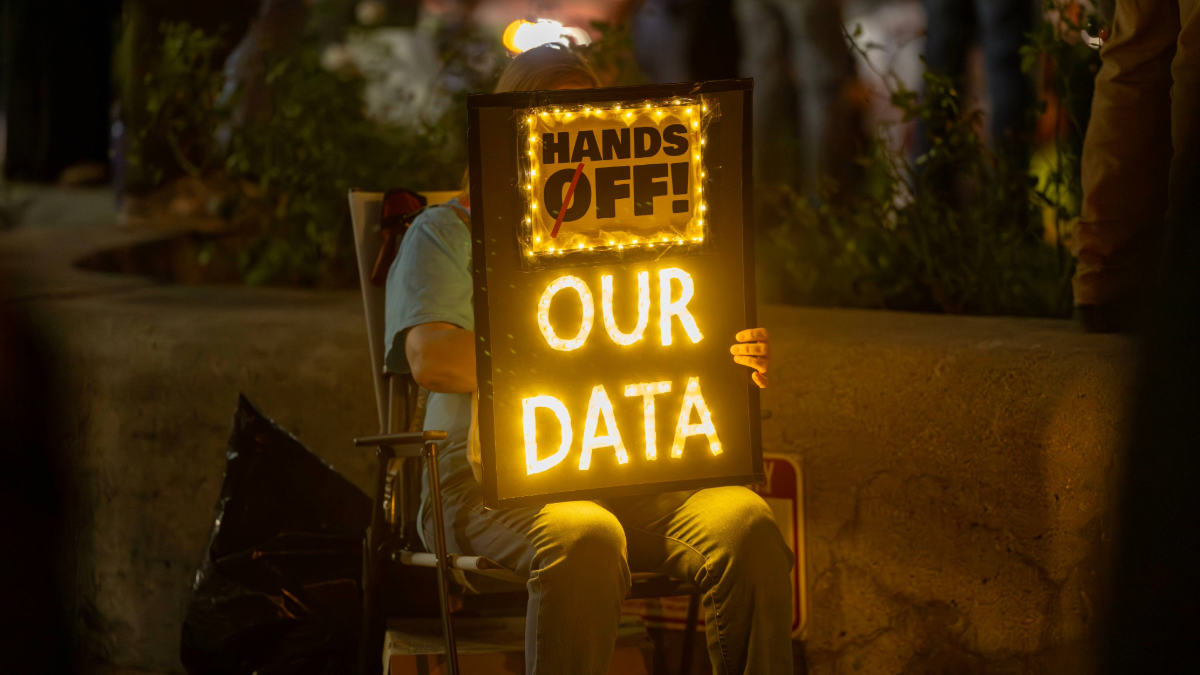DOGE & Disability Rights: Three Key Tech Policy Concerns
Ariana Aboulafia / May 12, 2025Ariana Aboulafia is a fellow at Tech Policy Press.

RIVERSIDE, CALIFORNIA—APRIL 5, 2025: A demonstrator expresses concerns over the sharing of private personal data by DOGE at a "Hands Off!" protest against the Trump administration. (Photo by David McNew/Getty Images)
Three months into the Trump administration, the Department of Government Efficiency (DOGE) has wreaked havoc on the United States federal government and on many individuals who rely on government services. This includes people with disabilities, who have been impacted by cuts to education programs, chaos at the Social Security Administration (SSA), the shuttering of digital services programs that focused on accessibility, and even mandatory return-to-office policies for federal workers, among other things. Despite the announcement that Elon Musk will soon be “stepping back” from his role at DOGE, there’s no indication that the agency will stop its crusade, regardless of the costs to everyday people. And, it will continue to use technology to do it.
I currently lead one of the only projects in the US that focuses on how technology (such as AI tools and algorithmic systems) impacts people with disabilities. From my vantage, it is clear that DOGE’s underlying ableist rhetoric both informs and forecasts its work, while its violations of data privacy and expansive use of AI without proper oversight have already harmed disabled people, and will continue to do so.
Underlying ableist rhetoric
On February 12, 2025, Elon Musk reposted a meme on X, the social network he owns, referring to people who benefit from federal programs as “member[s] of the Parasite Class.” Many people with disabilities disproportionately rely on federal programs like Social Security, as do low-income individuals and the elderly.
Ableist statements like this one have previously been condemned by UN officials, who argued that they put disabled people at risk of violence. The statement is also reminiscent of the 1927 US Supreme Court decision in Buck v. Bell that deemed forced sterilization of institutionalized disabled people constitutional. The Court’s rationale was partially based on the presumed “social inadequacy” of disabled people, which is similar to the idea that individuals who rely on federal programs, including people with disabilities, are “parasites” who are less deserving of rights or protection than others. (Notably, Buck v. Bell has never been formally overturned.)
This is far from the only ableist thing that Musk has said. Musk frequently uses the r-word on X, despite widespread agreement among disability advocates that use of the slur is unacceptable. Insofar as DOGE can be separated from Musk (which remains to be seen), it cannot be overlooked DOGE decisions that harm disabled people are overseen by an individual who consistently expresses disrespect for that very same population.
President Donald Trump has also exhibited several overt instances of ableism – from mocking a disabled reporter during his 2016 campaign to stating that his own disabled grandnephew “should just die” last year. And, Health and Human Services (HHS) Secretary Robert F. Kennedy Jr. has made ableist statements on many occasions, particularly surrounding autism. These statements are more than offhand comments – they can infect policy decision-making, including DOGE and the administration’s broader attack on diversity, equity, and inclusion (DEI), which can more accurately be considered an attack on DEIA (diversity, equity, inclusion, and accessibility).
While it is difficult to forecast exactly how ableist rhetoric will manifest in the remaining years of this administration, it is vital to pay attention to it – because it is both a contributor to and a harbinger of DOGE’s policies.
Potential data privacy violations
DOGE’s efforts to access, compile, and consolidate vast troves of sensitive data and repurpose it to suit the administration’s goals have rightly drawn ire. For example, my Center for Democracy & Technology colleague Elizabeth Laird has called DOGE’s compilation of IRS data for use by the Department of Homeland Security (DHS) in deportations “a significant departure…[from] longstanding norms and expectations that people have about what the government does with their data.” DOGE, and the larger administration, seem to have an inextinguishable thirst for personal information – so much so that the ACLU’s Cody Venzke has argued that it is likely that the government is attempting to create “a panopticon of a single federal database with everything that the government knows about every single person in this country.”
These actions pose significant data and personal privacy concerns. In general, the repurposing of information that was provided by individuals to the government for a particular reason – like receiving benefits or paying legally-required taxes – without consent undermines both privacy and trust in government. Also, there have been few-to-no assurances thus far that the information that is being compiled by DOGE in any of its efforts is being anonymized, aggregated, or even held securely in case of a hack or breach.
Such potentially grave privacy violations can have a disproportionate impact on disabled people, for two reasons: first, some of the particularly sensitive data being collected is related to health and/or disability, and second, disabled people are disproportionately likely to receive benefits and to have their information in these sorts of systems to begin with. For these reasons, disabled people are at risk of greater privacy and security harms, like having their information fall into the wrong hands, chilling rightful access to government benefits, and having their data used to justify funding cuts to the very programs on which they rely.
Given these amplified risks to disabled people, advocates should be on the lookout for any repurposing of data that is related to health or disability, particularly data housed in agencies like HHS and the Department of Veterans Affairs (VA), as well as data acquired from private sources like data brokers. When faced with these actions in the future, the disability community should not underestimate the power of pushback. Recently, HHS and the National Institutes of Health apparently backed down on a proposal to compile data to create an “autism registry” after significant outcry from the disability community.
Expansive use of AI without oversight
DOGE has led the charge in pushing what has been referred to as an “AI-first” strategy for government operations. According to the Brookings Institution, DOGE staffers are allegedly “…using AI to analyze agency operations, surveil communications, and probe an agency’s programs to aid Elon Musk’s goal of cutting $1 trillion from the federal budget.” Other outlets have reported that AI is being used to help DOGE determine where to make cuts at vital agencies, including the Department of Education, and that the administration has floated replacing some of the federal workers who have recently departed agencies with chatbots.
Just as privacy violations disproportionately affect disabled people, risks related to AI also threaten to have an outsized and negative impact on them. The disability community has already seen firsthand what happens when AI or algorithmic systems are introduced in these contexts. When states began incorporating algorithms into systems that determine care hours for home and community-based services, many disabled beneficiaries lost their care. Some people with disabilities even died as a result of these cuts, until attorneys were able to stop it.
DOGE will likely push for the use of AI in various contexts, including to make benefits determinations and to flag individuals alleged to have committed fraud or abused benefits systems – and disabled people will see the same devastating effects once again. The impending dissolution of the Administration for Community Living illustrates that DOGE and the Trump administration more broadly are willing to eliminate the agencies and policies that help keep disabled people integrated in their communities.
CDT, alongside the American Association of People with Disabilities, has released specific recommendations on building a disability-inclusive AI ecosystem. But there is no evidence that DOGE’s use of AI, thus far, has been done in ways that are disability-inclusive, or even responsible more generally.
Conclusion
As Sara Novic noted in the Guardian, the way that a government treats people with disabilities can be “an early indicator of its broader social policy intentions.” Disability rights are civil rights. Many of our civil rights are, and will continue to be, in DOGE’s crosshairs – but the worst outcomes are still preventable through coordinated, community-centered, and informed advocacy.
Authors
